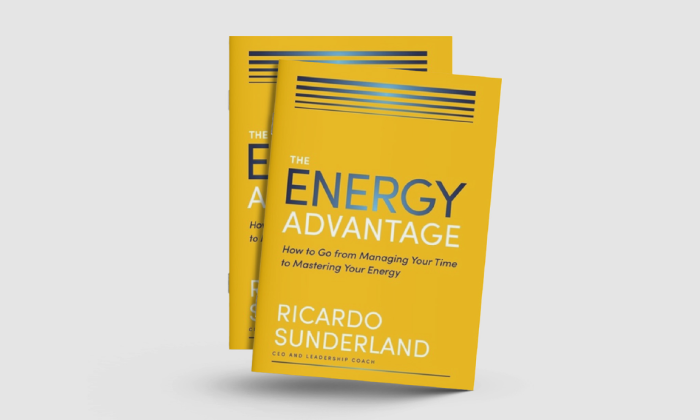Life has a way of surprising us. After bringing the message of my book, “The Energy Advantage: How to Go from Managing Your Time to Mastering Your Energy,” to the European and Latin American markets, visiting the Middle East felt like a dream—one we approached with great curiosity. How would leaders in this region feel about the concept of the book? Would they be willing to go deep when it comes to energy management?
The journey began in Riyadh, Saudi Arabia, and from the moment I arrived, I was struck by the pioneering energy that pulses through the region. The level of ambition is breathtaking—the pace, the scale, the boldness of megaprojects, the intent to transform deserts into global hubs. Mental and physical energy are clearly superpowers here. But beneath that, I sensed something more: a quiet reliance on heart energy. After all, you can’t mobilize millions without connecting deeply to a sense of purpose.
What makes the Middle East especially powerful today is the fusion of cosmopolitan dynamism and deep-rooted values in family, community, connection. This region is rewriting and scaling its economic playbook in real time while navigating complexity. That kind of transformation demands a special kind of energy: creative, grounded, and deeply intentional.
And that energy is everywhere. It’s in the speed with which ideas take shape and come to life—at times, it feels like things move at the speed of light. Leaders are pouring their energy and creativity into meaningful and lasting projects. At times, the intensity of this pioneering spirit risks tipping into overwhelm. Leaders here are acutely aware that sustaining such momentum requires more than grit—it calls for a new kind of energy regulation.
That awareness created a powerful opening for our conversations.
Across conversations with more than a hundred top leaders—CEOs, CHROs, and ExCo members—I saw something consistent: a hunger for alignment. In every leader, there was a longing to lead from a more grounded, human place. To create balance. To better align their time with their true priorities.
Our very first meeting, with the executive team of one of the region’s largest banks, set the tone. After introducing the concept of managing energy—not just time—the elder in the room asked:
“You’re talking about courageous hearts. What is a courageous heart?”
His question moved me deeply. I shared that a courageous heart is one that welcomes feeling—anytime, anywhere. When we learn to feel fully—sadness, guilt, anger, joy—we are no longer caught off guard. We gain freedom: freedom to choose how we respond, freedom to think more clearly, freedom to be.
That exchange opened a profound dialogue.
Another leader asked,
“Why do I feel safer opening my heart at work than I do at home?”
That vulnerability created a space to talk about emotional energy and purpose. Surrounded mostly by men, with a few women present, I was moved by their openness. “in a culture often perceived as less open to topics around energy management, what I found was deep curiosity and willingness to engage.
Westerners often assume we are the ones bringing “openness” to topics like energy management. But that assumption can blind us to the humanity in front of us. In every boardroom, at every dinner table—from Riyadh to Dubai, to Abu Dhabi—I saw leaders eager to update their belief systems. Eager to lead not just from the mind, but from the heart.
For example, one CEO asked me how I approach conversations on energy with Japanese executives, who are often perceived as reserved. I shared a breakthrough moment I had with a group of Japanese leaders when we explored the roots of sacrifice in their leadership identity. Many realized for the first time that perhaps the original intention of their parents and grandparents wasn’t for them to suffer—but to be happy. That recognition shifted everything.
That story deeply resonated. It held up a mirror. Leaders in the Middle East began asking themselves:
“What belief systems have I accepted? Are they helping me grow—or holding me back from being more human, more whole, more effective?”
Another interesting angle that came out was how to be bold and have the courage to engage in deeper conversations that are not typical in this part of the world—and how once the leader opens up and shows vulnerability, it creates a momentum of psychological safety and openness that spreads across the organization. The first conversation is difficult; but once leaders see the value, it grows exponentially.
The topic that seemed to resonate with many attendees is the one of questioning or letting go of some of the rules (implicit or outspoken) that we were taught by our parents or which we gave ourselves at some point. In many cases, this seems to inhibit executives from moving at pace or making decisions. On a bigger scale, it is an issue that often keeps family successions from being done soon enough or properly at all.
When I opened the talks in the Middle East, I started by sharing the reason behind the book: that the old leadership playbook—focused only on thinking and doing—is no longer enough. To thrive, we must integrate being and feeling. We must build not just effective executives, but whole human leaders. The resulting conversations across countries with those extraordinary leaders were truly a display of mutual curiosity and eagerness for self-development.
The conversations reflected what already lives strongly in this region: a deep understanding that effective leadership is as much about presence and empathy as it is about execution. It was a reminder that many leaders here are already walking that path—with intention and heart.
Note: All proceeds from the book sale will be donated to charity. If you have already purchased the book, please consider leaving a review on your e-commerce platform of choice.





